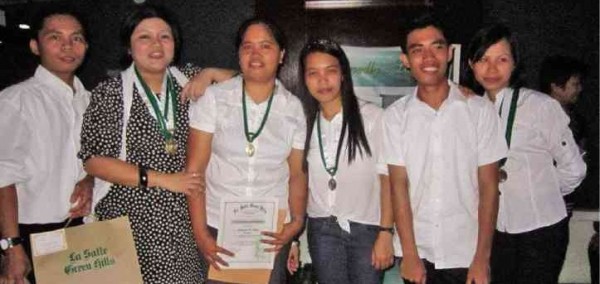There’s a poem near the end of this story. But first, the woman who wrote it recalls how, as a young child, she staved off hunger by “selling sand and stones.”
Nerissa Pura said she would collect them in a rusty biscuit can—picked from the ground like leftovers from someone else’s feast—at a construction site in her native Sorsogon province, carry the load on her frail shoulders, and make several trips to a shop that would pay P2 for a can of sand and P3 for the stones.
On certain days she also helped sell fish, usually after class at Cambulaga Elementary School, a 5-kilometer walk from home. Those were the days, Pura said, when her family was so poor that they would miss meals. Father’s income as a seafarer often ended up just paying old debts.
“We had a very hard life. We needed to work hard to have something to eat. As the eldest of six children, I had to help my mother. I didn’t have a choice,” Pura told the Inquirer.
At 15, she started out as a maid for a Parañaque City household, where the job included filling up two drums every day with water drawn from an artesian well; then later for another family in Manila who made her wash clothes till 2 a.m. and often gave her only two pieces of pan de sal for breakfast.
But today, thanks to her third employer in Cainta, Rizal province, who hired her in 1999, Pura’s days of toil extend to nights of hope.
She is among the 700 wage earners—domestic helpers, nannies, family drivers, messengers, bakery workers, etc.— currently enrolled at La Salle Green Hills (LSGH) Adult Night School in Mandaluyong City, where lifelong challenges for poor but deserving students could be overcome.
Those challenges include making up for lost time. Now aged 35, Pura can finally earn a high school diploma next March, 13 years after attending her last grade school class with an empty stomach.
For an annual fee of only P325—covering the P200 tuition, P50 parents-employer association fee and a P75 ID—she can be the latest product of the school which, since its establishment in 1978, has been giving a fresh start for “late-comers” like her.
La Salle Brothers’ vision
The school offers a five-year secondary education program and a 10-month vocational course that also stresses Christian formation and responsible citizenship. Classes are conducted mostly by regular teachers of LSGH, including an interpreter for deaf students.
The school principal, Rheal Dayrit, said Pura could be considered fortunate to have found an employer who not only allowed the housemaid to study after work but also paid close attention to her performance, helping her meet school requirements.
“The adult night high school is a manifestation of the vision of the La Salle Brothers to provide quality education for the poor and give second chances to those who stopped schooling,” Dayrit said.
Pura attends classes at 5:30 p.m. Home by 9:30 p.m., she can either resume her housework or do her assignments like any regular student.
“I always have that leeway. My employer is very kind to me, treating me as though I’m a member of the family,” she said, referring to her boss, Yasmin Gruet, a former director in a major food company.
Other members of the Gruet family find time to review her homework. If she needs to be in class earlier than usual, that’s also not a problem.
For it was the Gruets who urged her to try the night school and take the entrance exam. When she passed the test, they rewarded her with a trip to the mall where they shopped for her school supplies, bag, uniform and extra clothes.
Top of her class
Like a surrogate parent, Yasmin also accompanies her in school meetings, programs and other campus activities—like the cooking competition which they joined as a team last year. Their tandem won second place.
The family’s support must be paying off beyond expectations: Just this month Pura, a consistent honor student, again topped her class, was cited for perfect attendance and earned the “Outstanding Deportment” award.
She also won second place in an essay writing competition held by the school during the Linggo ng Wika (National Language Week) in August. Her piece explored how La Salle’s mission contributes to the campaign against corruption in the government.
She also wrote a poem titled “Katungkulan (Duty)” which became the piece for a recent sabayang pagbigkas (speech choir) performance of her class.
It was a pained cry from someone born to hardship, blaming her lot on ignorance and indolence, but also on the greed and apathy of those who were given power supposedly to lift the country’s poor.
“Simula nang ako’y nagkamalay, kahirapan aking nasilayan kaisipan ko’y naguguluhan / Sariling isipan nilawakan / Dahilan ng ating kahirapan, kamangmangan at katamaran / Oh! Sadyang may mga taong gahaman, pagkaupo’y walang pakialam sa mga taong nagluklok sa kinauupuan / Salapi ba ang inyong kaligayahan upang kababayan niyo’y talikuran, katungkulang sinumpaan?”
Not bad for a former stone picker from Sorsogon, who initially thought La Salle Green Hills was only for the rich and polished.
“I might have suffered a lot before, but everything’s worth it,” said Pura, who hopes to continue beyond high school and become a chef. “You just need to have patience and determination—and value the opportunity given by people who have faith in you.”
“When you have a dream, it will never be too late for you to achieve it.”
